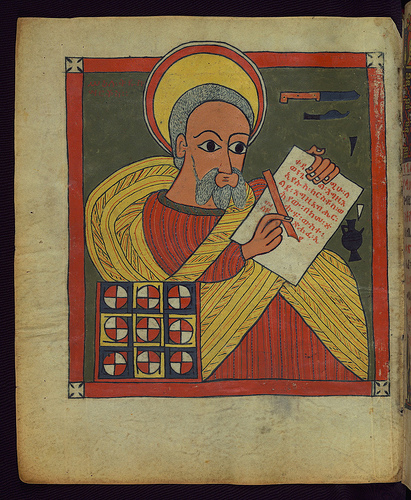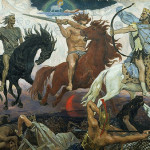We run our website the way we wished the whole internet worked: we provide high quality original content with no ads. We are funded solely by your direct support. Please consider supporting this project.

Are the Gospels Historical Fiction?
Some scholars today argue that the stories recorded in the Gospels are actually intentional fabrication. In essence, they argue that Mark took Paul’s theology and robed the story of Jesus in a fictitious historical narrative. The other Gospels followed suit. The argument is clever and removes the difficulty of explaining how a legend of a God-man could arise so quickly among first-century Jews.
But there are 7 major problems with this contention:
- The Gospels don’t read like a fictional genre of literature. To the contrary, they give us many indications that they genuinely intended to report reliable history. In addition, they pass all the standard tests scholars usually apply to ancient documents to ascertain a general historical reliability.
- We must ask why the authors of the Gospels would want to create a new, fictionalized Jesus story. What was their motivation? By the time that these authors were writing the Gospels, Christians were being tortured and put to death for their faith. So what could these authors have thought they or their readers would gain by fabricating and embracing this fictional story?
- We have to wonder why any early Christian would have accepted them as true.
- How did the authors of the Gospels think they could get away with creating a fiction situated in the recent past and in such close geographical proximity to their audiences? We must remember that Jewish religious authorities had a vested interest in putting an end to this movement, which they considered to be a dangerous sect. If the story these authors were telling was false, it seems it would have been relatively easy to expose it as such.
- To accept the version of the early church history offered by these scholars, we must also accept that the version of the church history given in the book of Acts is largely false. For many reasons that cannot be addressed here, the book of Acts is a remarkably reliable piece of ancient historiography.
- An understanding of the Gospels as fictitious completely ignores the role that writing plays in orally-dominant cultures. Writing was not the primary means of communication among people in the first century. Rather, information was passed along primarily by word of mouth. Writing plays a very different role in these cultures than in “literary cultures.” In literary cultures, novelty and innovation in literature is valued. In orally-dominant cultures, it is generally frowned upon. The primary purpose of writing, rather, is faithfully to re-express an established oral tradition.
- Research has demonstrated that in orally-dominant contexts people tend to be quite resistant to change in terms of the essential components. Oral performers—those who regularly recite oral traditions for their communities—are allowed a certain amount of flexibility in how they recite traditional material. But if the oral performer alters anything of substance in the tradition, members of the community customarily interrupt and correct him or her. Hence, the suggestion that a fictional writing from an anonymous author could have overturned established oral traditions about Jesus in the early church must be judged as massively improbable. This is simply not how orally-dominant cultures tend to operate.
—Adapted from Lord or Legend? pages 42-45
Image by Walters Art Museum Illuminated Manuscripts via Flickr
Category: Q&A
Tags: Bible, Biblical Criticism, Gospels, Jesus, Lord or Legend?
Topics: Biblical Reliability, Jesus: Lord or Legend
Related Reading

How to Interpret the Law of the Old Testament
While there are multitudes of passages in the OT that reflect an awareness that people are too sinful to be rightly related to God on the basis of the law, there is a strand that runs throughout the OT that depicts Yahweh as “law-oriented.” This label is warranted, I believe, in light of the fact…

If the violent depictions of God in the Bible are not completely accurate, isn’t all of Scripture up for debate?
Question: I’m very intrigued by your cruciform hermeneutics and can’t wait for your book (Crucifixion of the Warrior God) to come out. But I have to say that it strikes me as dangerous. You’re basically saying that the violent portraits of God in the OT are not completely accurate. But doesn’t this place us flawed…

Unpacking Revelation: Is it Literal?
According to many scholars as well as many Christian laypeople, the Jesus we find in the book of Revelation engages in a great deal of violence. This violence reaches a zenith in chapter 19 where we find Jesus going out to make war on a white horse (v. 11). He is dressed in a blood…

Isn’t it contradictory to say Jesus is “fully God” and “fully human”?
READER: God is, by definition, eternal, having neither beginning nor end. Human beings are, by definition, finite, beginning at a certain point in time. How, then, can Jesus be both God (eternal) and human (finite)? Isn’t that a contradiction? Similarly, while God is omniscient, humans aren’t. How could Jesus be both omniscient God and non-omniscient…

Friday Lights: Sibling Rivalry
Each Friday we post content sent to us by our readers that is inspiring, funny, lighthearted or just generally fun. If you’d like more information on submitting content for this feature you can get more information here. Today’s post comes to us from Mike Taylor. Thanks Mike!

The Incarnation: Paradox or Contradiction?
We’re in the process of flushing out the theology of the ReKnew Manifesto, and we’ve come to the point where we should address the Incarnation. This is the classical Christian doctrine that Jesus was fully God and fully human. Today I’ll simply argue for the logical coherence of this doctrine, viz. it does not involve…
